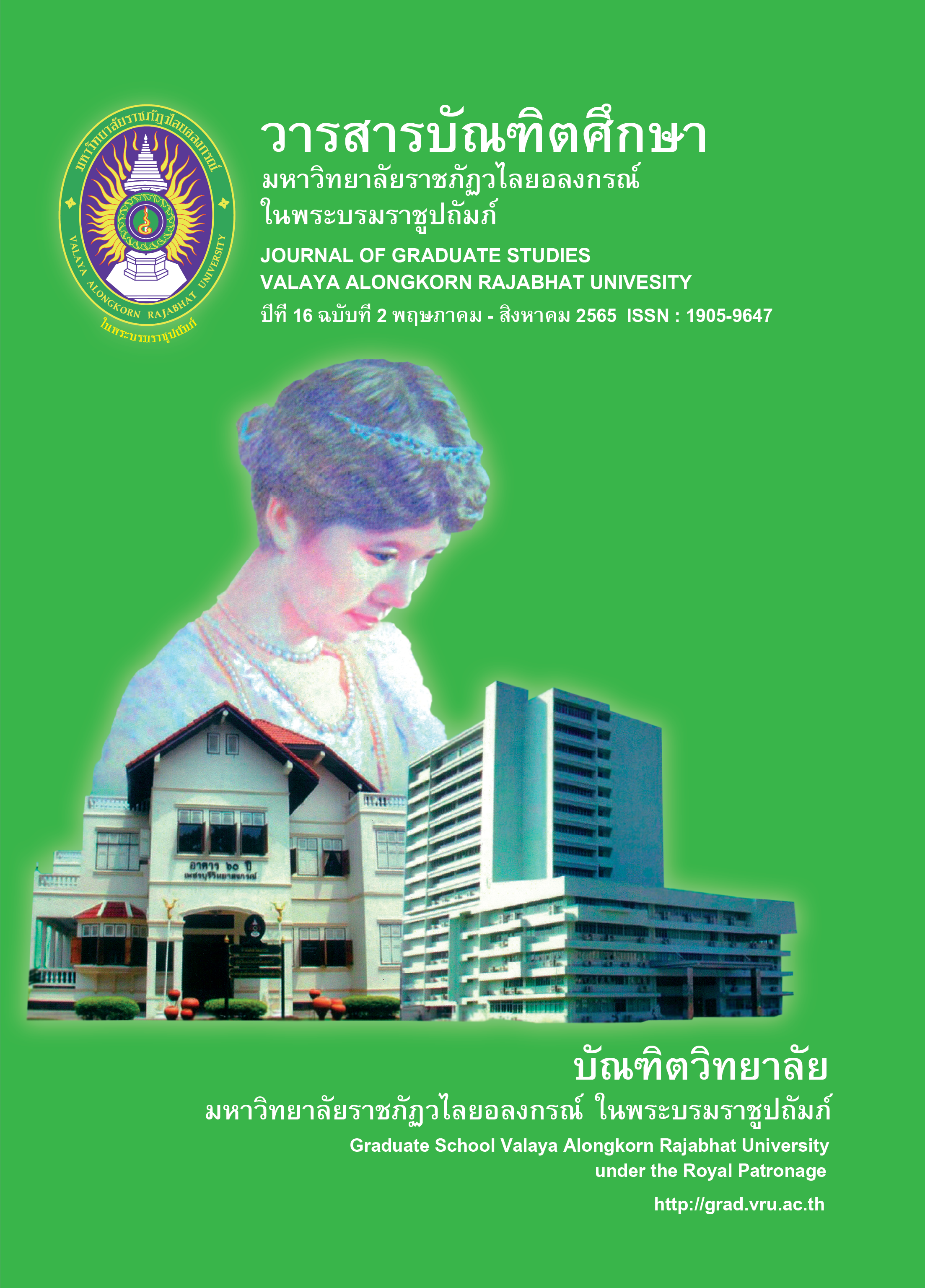A CAUSAL RELATIONSHIP MODEL OF FACTORS AFFECTED MARKET SHARE IN MANUFACTURING INDUSTRY IN THAILAND
Main Article Content
Abstract
This research aims to: 1) study a causal relationship model of factors affected market share in the manufacturing industry in Thailand, 2) examine the causal relationship patterns of factors developed with empirical data. An example used in the study is the manufacturing industry in Thailand. A total of 240 companies. The respondents were executives of the company, with 1 company able to answer the questionnaire by 1 person using the simple random sampling method. The research instruments consisted of questionnaire with the total reliability at 0.96. The statistical analysis was performed using descriptive statistics: frequency, and percentage and inferential statistics: Confirmatory Factor Analysis, and Path Analysis.
The results showed that: 1) the causal relationship model of factors affected market share in the manufacturing industry in Thailand, are structurally relevant, 2) the causal relationship of market share was consistent with empirical data. The market share of the manufacturing industry in Thailand is influenced by ERP implementation, and ERP implementation is influenced by the intention to use that includes perceived usefulness and perceived ease of use statistically significant at the 0.001 level.
Article Details

This work is licensed under a Creative Commons Attribution-NonCommercial-NoDerivatives 4.0 International License.
บทความทุกเรื่องได้รับการตรวจความถูกต้องทางวิชาการโดยผู้ทรงคุณวุฒิ ทรรศนะและข้อคิดเห็นในบทความ Journal of Global of Perspectives in Humanities and Social Sciences (J-GPHSS) มิใช่เป็นทรรศนะและความคิดของผู้จัดทำจึงมิใช่ความรับผิดชอบของบัณฑิตวิทยาลัย มหาวิทยาลัยราชภัฏวไลยอลงกรณ์ ในพระบรมราชูปถัมภ์ กองบรรณาธิการไม่สงวนสิทธิ์การคัดลอก แต่ให้อ้างอิงแหล่งที่มา
References
Amalnick, M. S., Ansarinejad, A., Nargesi, S. M., & Taheri, S. (2011). Newspective to ERP critical success factors: Priorities and causal relations under fuzzy environment. The Journal of Mathematics and Computer Science. 2(1), 160-170.
Amoako, G. K. & Salam, A. F. (2004). An extension of the technology acceptance model in an ERP implementation environment. Information & Management. 41(1), 731-745.
Antlova, K. (2009). Motivation and barriers of ICT adaptation in small and medium-sized enterprises. E + M Ekonomie a Management. 12(2), 140-155.
Awa, H. O., & Ojiabo, O. U. (2016). A model of adoption determinants of ERP within TOE framework. Information Technology & People. 29(4), 901-930.
Bentler, P. M., & Chou, C.-P. (1987). Practical issues in structural modeling. Sociological Methods & Research. 16(1), 78-117.
Chang, M. K., Cheung, W., Cheng, C. H., & Yeung, J. H. Y. (2008). Understanding ERP system adoption from the user’s perspective. International Journal of Production Economics. 113(2), 928-942.
Davis, F. D. (1989). Perceived usefulness, perceived ease of use, and user acceptance of information technology. MIS Quarterly. 13(1), 319-340.
Deelert, J., Jaturat, N., & Kuntonbutr, C. (2020). The study of mediating effect of ERP adoption on the relationship between technological context and organizational performance. Hatyai academic journal. 18(2), 261-273.
Fornell, C., & Larcker, D. F. (1981). Structural equation models with unobservable variables and measurement error: Algebra and statistics. Michigan: University of Michigan Press.
Kitrangsikul, N., & Kuntonbutr, C. (2017). The study of mediating effect of supply management capabilities on the relationship between information capabilities management and the organizational performance. International Journal of Applied Computer Technology and Information Systems. 7(1), 23-28.
Laakso, M. (2007). Challenges in ERP Implementations: Focus on Private Sector Organizations. Paper, Swedish School of Economics and Business Administration. Sweden.
Law, C. C., & Ngai, E. W. (2007). ERP systems adoption: An exploratory study of the organizational factors and impacts of ERP success. Information & Management. 44(4), 418-432.
Nandi, M. L., & Kumar, A. (2016). Centralization and the success of ERP implementation. Journal of Enterprise Information Management. 29(5), 728-750.
Ogbomo, M. O., & Ogbomo, E. F. (2008). Importance of information and communication technologies (ICTs) in making a heathy information society: a case study of Ethiope east local government area of delta state, Nigeria. Library Philosophy and Practice. 3(1), 1-8.
Sternad, S., & Bobek, S. (2013). Impacts of TAM-based external factors on ERP acceptance. Procedia Technology. 9(1), 33-42.
Zabukovsek, S. S., & Bobek, S. (2013). TAM-based external factors related to ERP solutions acceptance in organizations. International Journal of Information System and Project Management. 1(4), 25-38.


